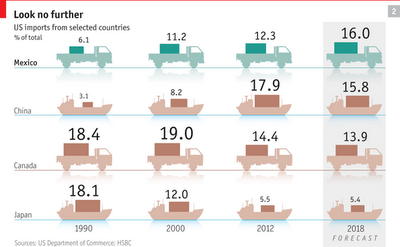Graph(s) of the week: adapting to technology

The Economist produced a great video this week in which it analyzes the US daily newspapers subscriptions and circulation. What's most interesting here is the analysis behind the recent success of the New York Times (NYT) and the Wall Street Journal (WSJ) and the downfall of USA today and LA Times. The reason in the divergence between these two groups of daily newspapers is in the adjustment of their demand to online subscribers. (see graphs below) New York Times print and online circulation. Source: The Economist Wall Street Journal print and online circulation. Source: The Economist USA Today and LA Times print and online circulation. Source: The Economist This is a perfect example of an adaptation to the new technological environment. The technological change in people's behavioral patterns was recognized firstly as a threat to the newspaper industry but after a while it was embraced and adjusted to. Advertising online couldn't be...







